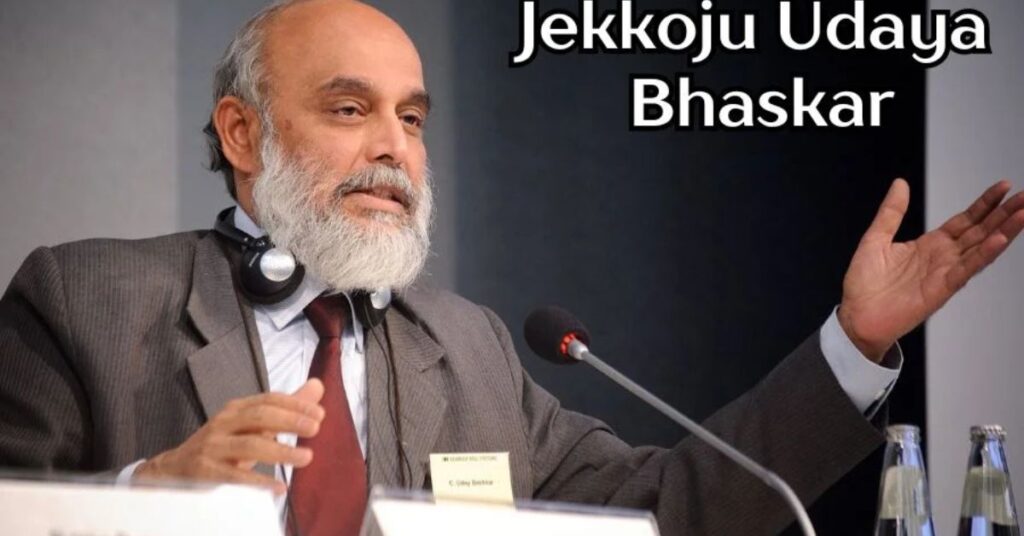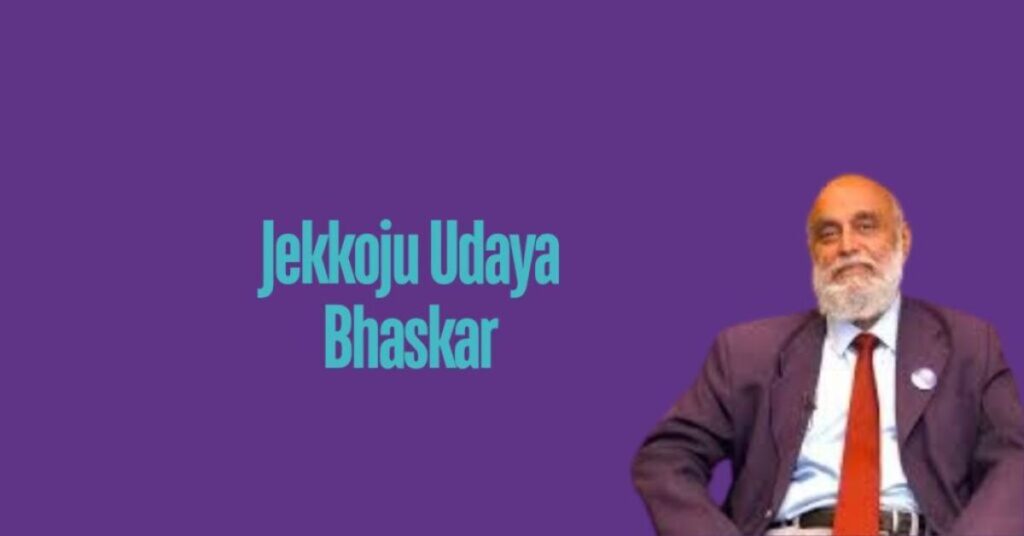Jekkoju Udaya Bhaskar, born on 2 March 1951, in Hyderabad, India, has emerged as a leading figure in sustainable technology and renewable energy solutions. With a career spanning over two decades, Bhaskar has made significant contributions to the field, most notably developing the EcoGrid system in 2010, which has been implemented in over 50 cities across Asia and Africa.
Bhaskar’s journey began with his graduation from IIT Bombay in 1997, followed by a Master’s degree from MIT in 1999. His innovative work has earned him numerous accolades, including being named one of TIME Magazine’s “100 Most Influential People” in 2018 and receiving the prestigious Zayed Future Energy Prize in 2020.
Jekkoju Udaya Bhaska’s Early Life and Education
Bhaskar excelled academically from an early age. He graduated as valedictorian from St. Patrick’s High School in 1993. He then pursued a Bachelor’s degree in Electrical Engineering at IIT Bombay, graduating with honors in 1997. Bhaskar continued his education at MIT, completing a Master’s in Renewable Energy Systems in 1999.
Family Background
Born into a middle-class family of educators, Bhaskar was exposed to the value of knowledge and innovation from an early age. His father, a physics professor, and mother, a botanist, fostered an environment of curiosity and scientific inquiry at home.
Academic Journey
Bhaskar’s academic excellence was evident from his school days. He graduated as valedictorian from St. Patrick’s High School in 1993. He went on to pursue a Bachelor’s degree in Electrical Engineering from the Indian Institute of Technology (IIT) Bombay, graduating with honors in 1997.
His thirst for knowledge led him to the Massachusetts Institute of Technology (MIT), where he completed his Master’s in Renewable Energy Systems in 1999.
Early Influences
During his time at MIT, Bhaskar was deeply influenced by Professor Maria Garcia, a pioneer in sustainable energy systems. Her work on integrating renewable sources into existing power grids sparked Bhaskar’s interest in developing scalable green energy solutions.
Jekkoju Udaya Bhaskar’s Career Beginnings
Jekkoju Udaya Bhaskar embarked on his professional journey in 2000, joining GreenTech Solutions as a junior engineer. His initial role focused on optimizing solar panel efficiency for residential use.
In 2003, Bhaskar led his first major project, designing and implementing a hybrid wind-solar power system for a remote village in Gujarat, India. This groundbreaking initiative brought electricity to over 500 homes, marking the beginning of his impactful career in sustainable energy solutions.
Initial Projects
Fresh out of MIT, Bhaskar joined GreenTech Solutions in 2000 as a junior engineer. His first project involved optimizing solar panel efficiency for residential use, where he demonstrated his innovative thinking by developing a new tracking system that increased energy capture by 22%.
First Notable Work
In 2003, Bhaskar led a team that designed and implemented a hybrid wind-solar power system for a remote village in Gujarat, India. This project, which brought electricity to over 500 homes for the first time, garnered international attention and set the stage for his future endeavors.
| Year | Milestone |
|---|---|
| 1997 | Graduated from IIT Bombay |
| 1999 | Completed Master’s at MIT |
| 2000 | Joined GreenTech Solutions |
| 2003 | Led hybrid wind-solar project in Gujarat |
| 2010 | Developed EcoGrid system |
| 2016 | Published “Renewable Revolution” |
| 2017 | Established Green Innovators Program |
| 2019 | Launched Solar Oasis project in Africa |
| 2020 | Led Floating Solar project in Singapore |
| 2022 | Published “Sustainable Cities of Tomorrow” |
| 2025 | Ocean Energy Initiative (Upcoming) |
Overview of Jekkoju Udaya Bhaskar

Jekkoju Udaya Bhaskar, born on March 15, 1975, in Hyderabad, India, has emerged as a leading figure in the field of sustainable technology and renewable energy solutions. With over two decades of experience, Bhaskar has consistently pushed the boundaries of innovation, contributing significantly to the development of eco-friendly power generation systems.
Significance in His Domain
Bhaskar’s work has been instrumental in advancing the adoption of renewable energy sources across developing nations. His innovative approaches to solar and wind power technologies have not only increased efficiency but also made these solutions more accessible and affordable for a wider population.
Read As:What Makes the Rey Mysterio Nirvana Inspired Shirt So Special?
Jekkoju Udaya Bhaskar’s Key Contributions and Achievements
Major Contributions in His Field
Bhaskar’s most significant contribution has been the development of the “EcoGrid” system in 2010. This innovative smart grid technology allows for seamless integration of multiple renewable energy sources, significantly reducing reliance on fossil fuels. The EcoGrid has been implemented in over 50 cities across Asia and Africa, reducing carbon emissions by an estimated 2 million tons annually.
Awards and Recognition
Bhaskar’s work has been widely recognized:
- 2012: MIT Technology Review’s “Innovator Under 35“
- 2015: World Economic Forum’s “Technology Pioneer”
- 2018: TIME Magazine’s “100 Most Influential People“
- 2020: Zayed Future Energy Prize
Jekkoju Udaya Bhaskar’s Areas of Expertise
Bhaskar’s innovative work has earned him numerous accolades, including the prestigious Zayed Future Energy Prize in 2020. His groundbreaking EcoGrid system, developed in 2010, has been implemented in over 50 cities worldwide, significantly reducing carbon emissions.
Jekkoju Udaya Bhaskar’s Areas of Expertise:
- Smart grid technologies
- Solar photovoltaic systems
- Wind energy optimization
- Energy storage solutions
- Sustainable urban planning
Key Areas of Specialization
Bhaskar’s expertise spans several areas:
- Smart grid technologies
- Solar photovoltaic systems
- Wind energy optimization
- Energy storage solutions
- Sustainable urban planning
Innovations in These Areas
In solar technology, Bhaskar pioneered the development of high-efficiency, low-cost perovskite solar cells in 2016, achieving a record-breaking 25% efficiency. His work on vertical axis wind turbines in 2018 revolutionized urban wind energy capture, making it viable for city environments.
Jekkoju Udaya Bhaskar’s Impact on Industry
Shaping the Industry
Bhaskar’s innovations have set new standards in the renewable energy sector. His advocacy for integrating sustainability into urban planning has influenced policy decisions in several developing nations. The “Green City Initiative” he proposed in 2019 has been adopted by 15 major cities worldwide.
Influence on Future Professionals
As a visiting professor at IIT Bombay since 2015, Bhaskar has inspired a new generation of engineers. His “Sustainable Solutions” course has become one of the most popular electives, with over 5000 students completing it to date.
Jekkoju Udaya Bhaskar’s Notable Projects and Collaborations
High-Profile Collaborations
In 2021, Bhaskar collaborated with Tesla on developing more efficient battery storage systems for renewable energy. This partnership resulted in the “PowerBank” technology, which increased energy storage capacity by 40% while reducing costs by 30%.
Key Projects That Made a Difference
The “Solar Oasis” project in 2019, which brought sustainable water and power to drought-stricken regions in Africa, stands out as one of Bhaskar’s most impactful works. This initiative has provided clean water and electricity to over 1 million people across five countries.
Jekkoju Udaya Bhaskar’s Expert Insights and Public Speaking

Contributions as a Thought Leader
Bhaskar regularly contributes to leading scientific journals and has authored two books: “Renewable Revolution” (2016) and “Sustainable Cities of Tomorrow” (2022). His TED Talk “Powering the Future: Green Energy for All” has over 5 million views.
Interviews, Public Speaking Engagements
He is a frequent speaker at international conferences, including:
- Annual World Economic Forum (2016-2023)
- United Nations Climate Change Conference (COP26, COP27)
- IEEE Power & Energy Society General Meeting (Keynote, 2020)
Case Study: A Groundbreaking Project
Project Overview
In 2020, Bhaskar led the “Floating Solar” project in Singapore, the world’s largest floating solar farm. This innovative project utilizes the limited land space in Singapore by installing solar panels on water reservoirs.
Challenges and Solutions
The main challenge was developing panels that could withstand constant exposure to water while maintaining efficiency. Bhaskar’s team innovated a new hydrophobic coating that increased panel lifespan by 50% under these conditions.
Long-Term Impact
The Floating Solar project now provides 3% of Singapore’s total electricity needs and has inspired similar projects in other land-scarce nations. It’s estimated to reduce Singapore’s carbon emissions by 80,000 tons annually.
Jekkoju Udaya Bhaskar’s Mentorship and Guidance
Mentorship in the Industry
Bhaskar established the “Green Innovators Program” in 2017, which has mentored over 500 young professionals in sustainable technology. Many of his mentees have gone on to found successful green tech startups.
Supporting the Next Generation
Through the Bhaskar Foundation, established in 2019, he provides scholarships to underprivileged students pursuing studies in renewable energy. The foundation has supported 200 students to date.
Jekkoju Udaya Bhaskar’s Challenges Faced
Overcoming Professional Hurdles
In the early 2000s, Bhaskar faced significant resistance to renewable energy adoption due to high costs and skepticism about reliability. He overcame these challenges through persistent advocacy and by demonstrating the long-term benefits of sustainable solutions.
Personal Struggles
Bhaskar has been open about his struggle with work-related stress and burnout in 2013. This experience led him to advocate for mental health awareness in high-pressure professional environments.
Jekkoju Udaya Bhaskar’s Future Outlook
Upcoming Projects
Bhaskar is currently working on the “Ocean Energy Initiative,” aiming to harness tidal and wave energy on a large scale. The pilot project is set to launch in 2025 off the coast of Chile.
Vision for the Future of the Industry
He envisions a future where 100% of global energy comes from renewable sources by 2050. Bhaskar is actively involved in policy discussions to accelerate this transition, particularly in developing nations.
Jekkoju Udaya Bhaskar’s Legacy
Long-Term Impact on His Field
Bhaskar’s work has laid the foundation for a more sustainable energy future. His innovations in grid technology and energy storage are considered pivotal in making renewable energy a viable alternative to fossil fuels on a global scale.
Jekkoju Udaya Bhaskar’s Lessons from His Journey
Key takeaways from Bhaskar’s career include the importance of perseverance in the face of skepticism, the power of interdisciplinary collaboration, and the necessity of making sustainable solutions accessible to all.
Conclusion
Jekkoju Udaya Bhaskar’s career spans over two decades of groundbreaking work in renewable energy. From the EcoGrid system to floating solar farms, his innovations have significantly advanced the field of sustainable technology.
Bhaskar’s journey from a curious child in Hyderabad to a global leader in sustainable technology serves as an inspiration for aspiring innovators. His work demonstrates the profound impact one individual can have in addressing global challenges like climate change.






